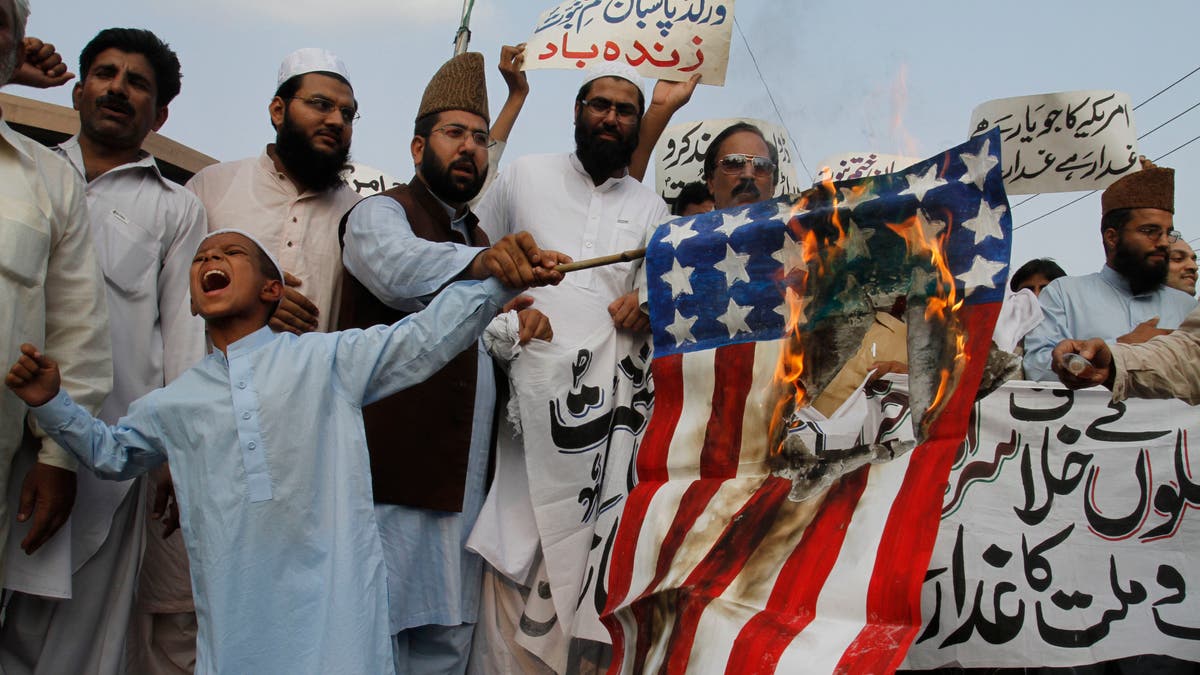
Burning the American flag can be deadly. (AP) (AP/ K.M. Chaudary)
ISLAMABAD – Bureaucratic delays have held up shipments to troops in Afghanistan through Pakistan, officials said Wednesday, a week after Islamabad reopened U.S. and NATO supply lines.
So far, only a handful of supply trucks have crossed the border, which Pakistan closed to the convoys last November after American airstrikes accidentally killed 24 Pakistani border troops. Islamabad agreed to reopen the supply routes on July 3, after months of negotiations and a U.S. apology over the incident.
Two trucks carrying supplies to U.S. and NATO troops passed through the Chaman border crossing in the southern province of Baluchistan last Thursday. A Pakistani customs official said no other trucks have crossed since then.
Four trucks from the port city of Karachi arrived at the border Wednesday and were expected to cross on Thursday, the official said. Chaman is one of two border crossings used to transport NATO supplies.
Trucks have yet to pass at Torkham, the second crossing, a regional official in northern Pakistan said. Both officials spoke on condition of anonymity because they were not authorized to speak to reporters.
Since the official resumption of the supply route, not a single fuel truck has left either of the two main ports in Karachi, said Israr Shinwari, president of the All Pakistan Tankers Association.
He blamed bureaucracy for the delay, saying that procedures and paperwork must be completed before goods and fuel can even be loaded on the trucks.
Goods shipments appeared likely to resume before fuel supply, Shinwari said, and the tankers are expected to move in about a week.
Pakistan is a notoriously bureaucratic country where obtaining permits or processing paperwork can take a frustratingly long time.
Before the closure, 150 to 200 trucks carrying NATO supplies crossed the border daily.
Few expected shipments to reach those numbers immediately after Pakistan reopened the supply lines, and the delay did not appear to reflect a change of heart on the side of the Pakistani government. The trucks have been waiting in Karachi for months and need maintenance and proper customs clearance before any movement can take place, officials and drivers said.
Pakistan Prime Minister Raja Pervaiz Ashraf said in a statement Wednesday that Pakistan decided to reopen the supply lines "in the interest of regional peace and stability." He made the comments during a meeting with the outgoing U.S. ambassador, the statement said.
Security also appeared to play a role in the delay.
Mansoor Ahmad, a representative of a company that has 100 containers waiting for shipment in a warehouse in Karachi, said his firm was worried about security, given recent anti-NATO protests in Pakistan.
On Monday thousands of people rallied in Islamabad against the government's decision to reopen the supply lines. Anti-American sentiment in Pakistan is high, in part due to the continued strikes by American drones aimed at militant targets in tribal areas, and because the U.S. has accused Pakistan of harboring militants that attack its forces in Afghanistan.
More protests are scheduled for the coming days.
The Taliban and other militant groups have threatened to attack trucks carrying NATO supplies. Before the closure, militants sometimes shot at or bombed the trucks.
A test run to Chaman was successful, Ahmad said, with four trucks arriving safely at the crossing on Wednesday. The company is now assessing how to proceed.
"We can't take risks in such a situation. We are concerned about security," he said.
One truck driver in Karachi acknowledged that the anti-NATO protests were a concern.
"There are protests against the supply. The religious forces are not accepting this (decision). We are very concerned over the situation," said Azeemullah, who, like many people in the country, uses a single name.
Also in Karachi, a bomb attached to a bicycle hit a bus carrying employees of Pakistan's main space agency, killing at least one person and wounding 23 others, senior police officer Naeem Akram said.
There was no claim of responsibility, and it was not clear whether the bus was specifically targeted.
___
Associated Press writers Munir Ahmed and Asif Shahzad contributed to this report.







































